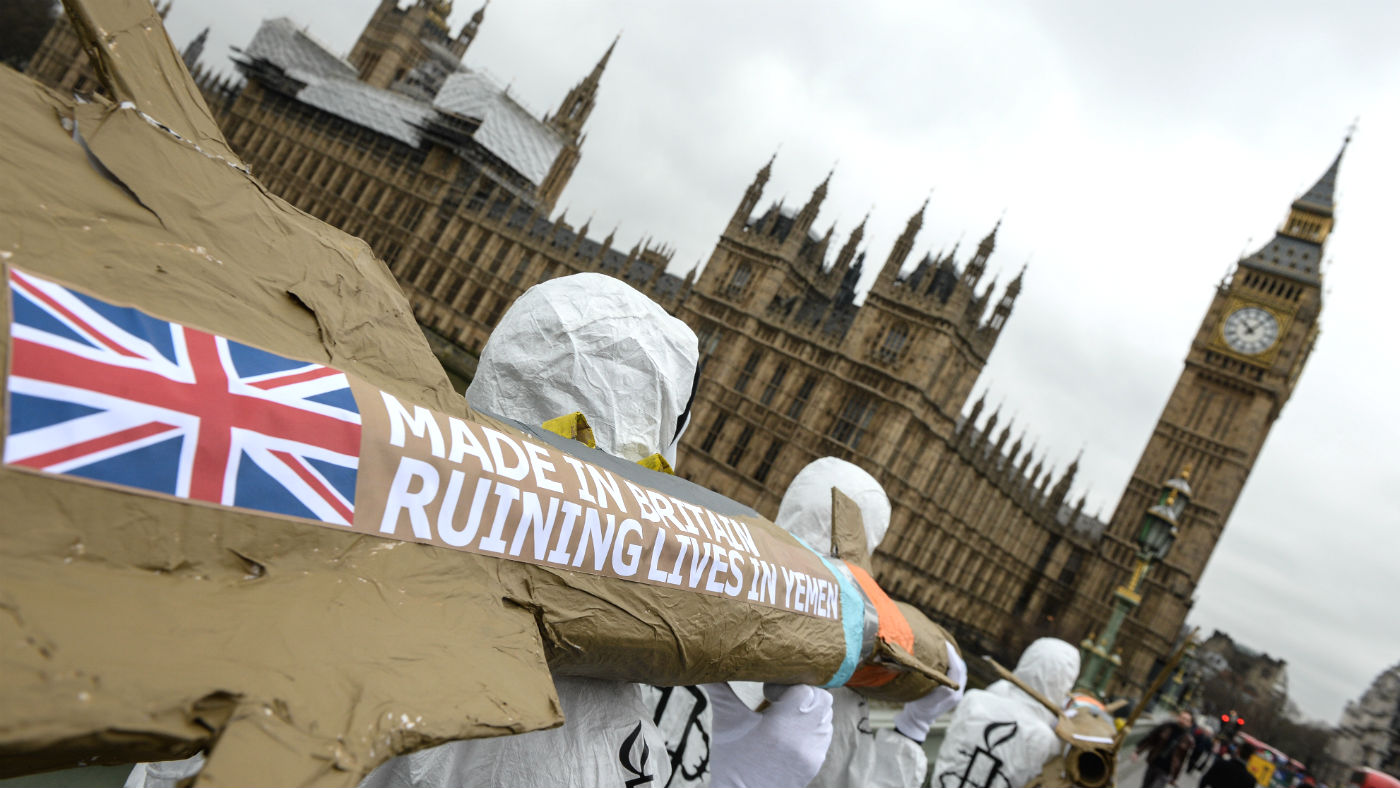UK-Saudi joint military exercise comes under fire
Britain accused of ‘abdicating its moral responsibility’ by backing Saudi regime

A free daily email with the biggest news stories of the day – and the best features from TheWeek.com
You are now subscribed
Your newsletter sign-up was successful
The UK has been accused of abdicating its moral responsibility by taking part in joint military exercises with Saudi Arabia amid growing international condemnation over its role in Yemen’s brutal civil war.
Around 100 Royal Navy personnel are to participate in the five-day drill with Saudi forces this week, with a second operation involving the British Army scheduled for March.
It comes at a time of growing pressure on the Saudi regime over the state-sponsored killing of prominent opposition journalist Jamal Khashoggi in Istanbul in October, as well as its ongoing role in Yemen.
The Week
Escape your echo chamber. Get the facts behind the news, plus analysis from multiple perspectives.

Sign up for The Week's Free Newsletters
From our morning news briefing to a weekly Good News Newsletter, get the best of The Week delivered directly to your inbox.
From our morning news briefing to a weekly Good News Newsletter, get the best of The Week delivered directly to your inbox.
Writing in The Independent, the shadow defence secretary Nia Griffiths says: “It simply beggars belief that we would even consider a joint exercise with the very same Saudi Navy which blockades key ports in Yemen, thereby exacerbating the starvation and suffering of the Yemeni people.”
The four-year civil war has killed an estimated 10,000 people and the UN has warned the country is on the brink of “the worst famine in the world in 100 years”.
Yet over the same period, Saudi Arabia has become the UK’s biggest arms importer, with sales totalling £4.6 billion.
“To go ahead with these exercises not only represents a complete abdication of this country’s moral responsibility, it also reveals a bleak, pessimistic view of Britain’s place in the world,” Griffiths added.
A free daily email with the biggest news stories of the day – and the best features from TheWeek.com
In November, Denmark followed Germany to become the latest country to suspend the export of military equipment to Saudi Arabia.
In 2017, the High Court in London dismissed a case brought by Campaign Against the Arms Trade (CAAT), which argued that arms sales to Saudi Arabia should be halted because of the risk that the weapons would be used to commit serious violations of international humanitarian law in Yemen.
The case, which is set to be heard before the Court of Appeal in April, comes as the UK’s links to the Saudi regime fall under increasing scrutiny.
It has been revealed that “more than half a billion pounds of council workers’ pension money has been directly invested by local authorities in arms companies implicated in Saudi Arabia’s military campaign in Yemen, in which thousands of civilians have been killed”, reports The Guardian.
Using freedom of information requests, the paper has found that 43 UK council pension funds have a total of £566m invested in in BAE Systems, Airbus, Lockheed Martin, Raytheon and Northrop Grumman.
Last week, The Sunday Telegraph disclosed that 268 Saudi police officers were trained in Britain in 2018, “despite claims the skills they acquire could help the regime commit torture” back home.
The Telegraph says the figure “dwarfs the number sent by other countries at the same time and comes as the regime faces accusations it arrested and tortured children, including some who were sentenced to death, according to a human rights charity”.
-
 The 8 best TV shows of the 1960s
The 8 best TV shows of the 1960sThe standout shows of this decade take viewers from outer space to the Wild West
-
 Microdramas are booming
Microdramas are boomingUnder the radar Scroll to watch a whole movie
-
 The Olympic timekeepers keeping the Games on track
The Olympic timekeepers keeping the Games on trackUnder the Radar Swiss watchmaking giant Omega has been at the finish line of every Olympic Games for nearly 100 years
-
 Epstein files topple law CEO, roil UK government
Epstein files topple law CEO, roil UK governmentSpeed Read Peter Mandelson, Britain’s former ambassador to the US, is caught up in the scandal
-
 Iran and US prepare to meet after skirmishes
Iran and US prepare to meet after skirmishesSpeed Read The incident comes amid heightened tensions in the Middle East
-
 Israel retrieves final hostage’s body from Gaza
Israel retrieves final hostage’s body from GazaSpeed Read The 24-year-old police officer was killed during the initial Hamas attack
-
 China’s Xi targets top general in growing purge
China’s Xi targets top general in growing purgeSpeed Read Zhang Youxia is being investigated over ‘grave violations’ of the law
-
 Panama and Canada are negotiating over a crucial copper mine
Panama and Canada are negotiating over a crucial copper mineIn the Spotlight Panama is set to make a final decision on the mine this summer
-
 Why Greenland’s natural resources are nearly impossible to mine
Why Greenland’s natural resources are nearly impossible to mineThe Explainer The country’s natural landscape makes the task extremely difficult
-
 Iran cuts internet as protests escalate
Iran cuts internet as protests escalateSpeed Reada Government buildings across the country have been set on fire
-
 US nabs ‘shadow’ tanker claimed by Russia
US nabs ‘shadow’ tanker claimed by RussiaSpeed Read The ship was one of two vessels seized by the US military